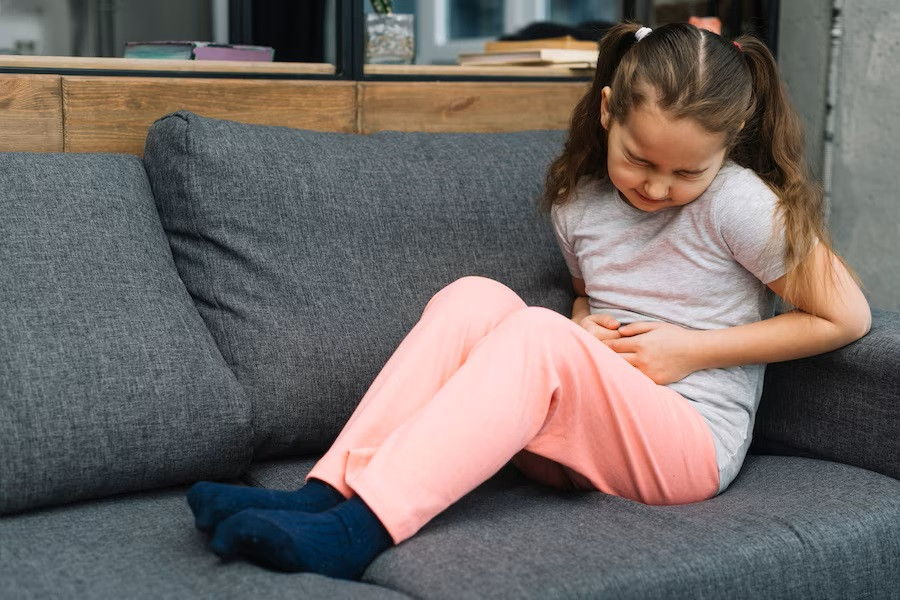Diarrhea is a condition where bowel movements are more frequent than usual (>3 times a day) and stools are more liquid than normal. Diarrhea in children can be caused by a variety of factors, including viral or bacterial infections, contaminated food or drink, food intolerances, allergic reactions or other medical conditions.
In the case of diarrhea in children, proper care and prompt treatment are key to preventing dehydration and further complications. So what should parents do when a child has diarrhea?
Guidelines for managing diarrhoea in children
Mild diarrhea without vomiting
Mild diarrhea in children can often resolve on its own within a few days, especially if there are no serious symptoms or signs of dehydration. You can continue to give your child breast milk, formula or other liquids that they normally drink. However, if the child seems bloated after drinking cow's milk or formula, consult a doctor.
Children with mild diarrhea can continue their usual diet and do not need to avoid their usual foods unless recommended by a doctor. Avoid giving antidiarrheal drugs or other medications without consulting a doctor.
Observe signs of dehydration in children, which include dry mouth and lips, sunken eyes, lack of urination and weakness. If you find these signs, consult a doctor immediately.
Diarrhea with vomiting
Diarrhea accompanied by vomiting can be caused by many things, such as bacterial or viral infections of the gastrointestinal tract or food poisoning. Vomiting during diarrhea has a scale of severity that you need to monitor, including:
- Mild vomiting: 1-2 times a day
- Moderate vomiting: 3–7 times a day
- Severe vomiting: vomiting 8 times a day or more
Parents can take the following actions to help their children avoid dehydration when they have diarrhea and vomiting:
- Give electrolyte solutions in small amounts and frequently to help prevent dehydration
- Avoid giving all solid foods and baby food while the child is still vomiting
- You can try giving easily digestible foods, such as biscuits, after 8 hours when the child is not vomiting
- Pay attention to other symptoms such as fever, weakness or signs of dehydration
- Pay attention to the negative reaction of the child's body in response to the food eaten
Severe diarrhea
Severe diarrhea is usually indicated by several symptoms, including:
- Having diarrhea more than ten times per day
- The presence of mucus or blood during bowel movements
- Sudden weight loss
- Red or black stools
- Accompanied by a fever of more than 38 degrees Celsius
- Diarrhea accompanied by nausea and vomiting with every meal or drink
- The child complains of abdominal pain
- Diarrhea is experienced after traveling from another area
- Signs of dehydration accompany diarrhea, such as dark urine, less urination, headaches, dry skin, fussiness, and confusion
It's important to seek immediate medical attention if children have diarrhea every 1-2 hours or more often, or if they show signs of dehydration. In severe cases of dehydration, children may need intravenous fluids. Don't hesitate to take your child to the doctor if they show symptoms of severe diarrhea. For mild symptoms, you can make use of the consultation features that are available in the Ai Care application by downloading the Ai Care application from the App Store or Play Store.
Looking for more information about other diseases? Click here!
- Sean Edbert Lim, MBBS
Healthy Children.org (2021). Diarrhea in Children: What Parents Need to Know. Available from: https://www.healthychildren.org/English/health-issues/conditions/abdominal/Pages/Diarrhea.aspx
Health Direct (2021). Diarrhoea in children. Available from: https://www.healthdirect.gov.au/diarrhoea-in-children
WebMD (2023). Diarrhea. Available from: https://www.webmd.com/digestive-disorders/digestive-diseases-diarrhea
Seattle Children's (2023). Vomiting With Diarrhea. Available from: https://www.seattlechildrens.org/conditions/a-z/vomiting-with-diarrhea/











